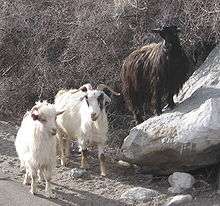Changthangi

The Changthangi ,"'Changra"'or Pashmina goat, is a breed of goat inhabiting the plateaus in Tibet, Nepal and neighbouring areas of Ladakh in Jammu and Kashmir, India. They are raised for ultra-fine cashmere wool (known as pashmina once woven) but were also reared for meat in the past.
This bloodline of the capra hircus or Cashmere goat, grows a thick, warm undercoat which is the source of Kashmir Pashmina wool - the world's finest Cashmere measuring between 12-15 microns in fiber thickness. These goats are generally domesticated and are reared by nomadic communities called the Changpa in the Changthang region of Greater Ladakh. The Changpa communities are a sub-sect of the larger Buddhist Drokpa community in northern Indian state of Jammu & Kashmir.
They survive on grass in Ladakh, where temperatures plunge to as low as −20 °C (−4.00 °F). These goats provide the wool for Kashmir's famous Pashmina shawls. Shawls made from Pashmina wool are considered very fine, and are exported worldwide.
The Changthangi goats have revitalized the poor economy of Changthang, Leh and Ladakh region.[1]
Noori, the world's first cloned Pashmina goat, was cloned at the Faculty of Veterinary Sciences and Animal Husbandry of the Sher-e-Kashmir University of Agricultural Sciences and Technology of Kashmir (SKUAST) in Shuhama, 25 km east of Srinagar, on March 15, 2012.
See also
| Wikimedia Commons has media related to Changthangi. |
References